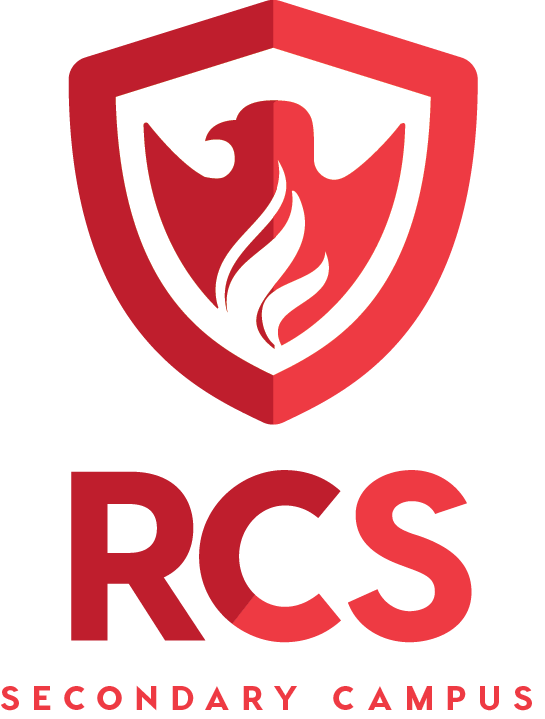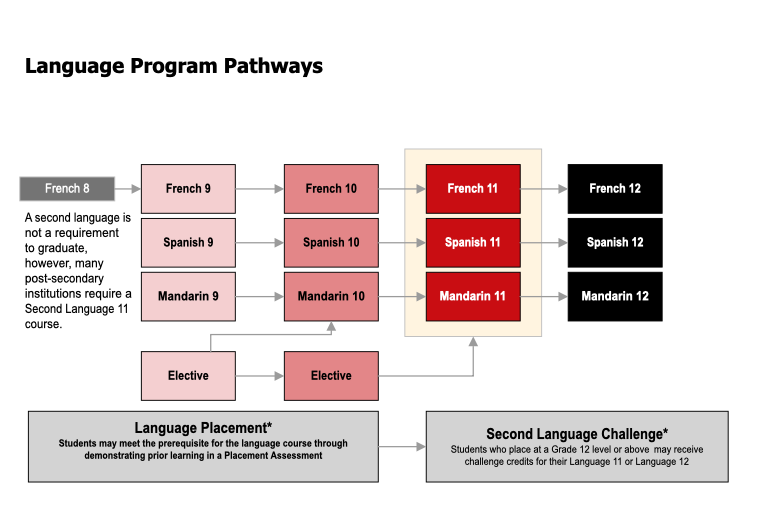
CURRICULUM & COURSE INFORMATION
ADST
MATH
ARTS
PHE
BIBLE
SCIENCE
CAREER
SOCIALS
ENGLISH
ESS
LANGUAGES
HOME
LANGUAGES
Through learning a new language and understanding a new culture we hope that students will respect and appreciate similarities and differences between them and others, as well as use their language knowledge to reach out and care for others.
RCS Secondary Languages
Second Languages offered at the Secondary Campus include:
- French
- Mandarin
- Spanish
Spanish and Mandarin are beginner courses in Grade 9, although they progress more quickly in the four years than French.
All these languages are Second Language, not immersion options. Students will be able to read, write, understand, and converse in their second language on specific topics at a conversational level, but not fluently. The goal of a high school language classroom is competency, not fluency.
Considerations when deciding on the language stream
What language does my child demonstrate an aptitude for?
- French and Spanish are very similar, are Romance languages, and use the same alphabet as English
- Mandarin – tonal in nature, no alphabet, different character for each word
What language will help my child in their future life choices (job, travel, missions)?
- French: Canada is a bilingual country, and many RCS students have a foundation in this language. Over 500 million people world-wide speak it and many Canadian government jobs require it. French is the fifth most spoken language globally and it is the language of instruction for 93 million students.
- Spanish: Much of the Western Hemisphere, and over 500 million people world-wide speak it. Canada has strong ties to the USA and Mexico so is helpful for business, tourism, and hospitality careers. Spanish is the second most natively spoken language and fourth most spoken language overall globally.
- Mandarin: Over 1 billion people worldwide speak this language. Canada has strong ties to China in business and Richmond/Vancouver have a strong Mandarin speaking community. Mandarin is the most widely spoken language in the world after English.
Graduation Requirements Statement
Students do not require a second language to graduate.
Additional Information
Many post-secondary institutions require a second language up to the Grade 11 level for admissions. Please go to their website. For any assistance, please contact the academic counselor.
Language Placement Process:
To be exempted from the prerequisite for a language course, a language placement assessment is available each year only to students who have either immersion background or have formal education in the language and speak the target language at home. Students must possess the ability to speak, listen, read and write above at grade 9 level to be eligible. Students are only able to take the Language Placement Assessment/Challenge one time during their schooling at RCS.
The placement assessment tests all four language skills, and students must be proficient in all four skills (Speaking, Listening, Reading, Writing) at the appropriate level to pass that language level.
The placement process involves a language test done On Wednesday February 21, 2024
Please complete this form to register: Language Placement Assessment Registration
Language Course Challenge (to get credits for a Language 11 or 12 course without taking the course)
Students who successfully place at the Grade 12 level or above on their language placement assessment will be given the option to complete a cultural portfolio assignment to receive credit for either Language 11 or Language 12 (depending on their language skill level). Students will need to complete this assignment by the end of Quarter 2 of their Grade 9 year.
The Language Challenge Credit will meet the Language Entrance requirement for university. However, not all institutions will use the mark in the calculation for your entrance GPA (e.g. UBC and U of T will not use it in the calculation of your Academic GPA). A successful challenge results in a student receiving credit for the appropriate content as well as a school mark.
Challenge is not envisioned as a way for students to improve their course marks, or as a replacement for the valuable experience of learning in a classroom setting. Challenge is intended to acknowledge student learning so that students do not have to participate in courses, which would be repetitive for them. It also allows students to broaden their high school program by selecting additional courses or to enrich their lives in other ways, such as pursuing personal passions in ADST or the Fine Arts.

FRENCH
French 9
Prerequisite: French 8
Description: French language courses build on pre-existing grammatical knowledge and abilities to enhance reading, writing, listening, and speaking skills. Students will be learning and incorporating new tenses to communicate in the past and future and other grammatical structures that allow for more detailed communication. Students will also be given opportunities to explore Francophone culture and present on a Francophone cultural tradition or holiday of their choice. French is an official language in 29 countries and is widely spoken around the globe. Speaking French is especially useful for work in government, diplomacy, and in missions.
French 10
Prerequisite: French 9
Graduation Requirement: Elective
Description: In French 10 students will build on pre-existing grammatical knowledge and abilities from French 9 to enhance reading, writing, listening, and speaking skills. Students will be learning and incorporating past continuous, simple future, and conditional tense as well as other new grammatical structures that allow for more nuanced communication. Students will also be given opportunities to explore French-Canadian culture and present on a notable French-Canadian of their choice.
French 11
Prerequisite: French 10
Graduation Requirement: Elective
Description: In French 11 students will build on pre-existing grammatical knowledge and abilities from French 10 to enhance reading, writing, listening, and speaking skills. Students will be learning and incorporating new grammatical structures that allow for more sophisticated communication. Students will be given opportunities to explore Francophone culture and present on a cultural element of their choice. Most post-secondary programs require at least a Language 11 so taking this course is recommended for French students. Students do not require a Language 11 course to graduate.
Note: Students do not require a Language 11 course to graduate, but most post-secondary programs require at least a Language 11.
French 12
Prerequisite: French 11
Graduation Requirement: Elective
Description: In French 12 students will continue in their acquisition of speaking, reading, listening, and writing skills. Students will be incorporating pluperfect and subjunctive tense as well as other new grammatical structures that allow for more expressive communication. Students will be given opportunities to explore Francophone culture and present on a cultural element of their choice. Although it may not be required for entrance to some post-secondary programs, a Language 12 course (or its university-level equivalent) may be required for graduation from some post-secondary programs.
Note: Although it may not be required for entrance to some post-secondary programs, a Language 12 course (or its university-level equivalent) may be required for graduation from some post-secondary programs.
MANDARIN
Mandarin 9
Mandarin 9 is an entry-level course of Mandarin Chinese designed for students who are beginning learners of the language and have little-to-no background in written and/or oral Mandarin Chinese. Students who read/write little to no Chinese characters or who speak another Chinese variety at home may also take this course. The core skills of reading, writing, listening, speaking, and interacting in Mandarin Chinese will be developed, with a focus on communication in meaningful, practical contexts. This course aims not only to teach the language in both written and oral forms but also to teach about the culture of Chinese people around the globe. It is also the hope of this course that they may use the language skills and cultural knowledge to spread the love of Christ to the people of Chinese heritage that they will encounter throughout their lives. We will be using a variety of materials to learn Mandarin speaking, reading, writing and listening skills. Students will learn Pinyin (Chinese Romanization System), and learn to write some basic Chinese characters and to have basic conversations in Mandarin. By the end of the course, the student will learn around 250 Chinese characters and will be able to engage in dialogues that introduces oneself and one’s family, food, routines, and celebrations.
Recommendations: Recommended for those with very little to no language skills in Mandarin speaking or writing.
Mandarin 10
Prerequisite: Mandarin 9
Graduation Requirement: Elective
The Mandarin 10 course builds on the big ideas and skills established in Mandarin 9. Through learning a new language and understanding a different culture, students will respect and appreciate similarities and differences between themselves and others. By the end of the course, the student will learn another 220 Chinese characters; the study of language will be intertwined with culture, through thematic units, during which students will engage in dialogues about school life, leisure activities, places that we live and socializing. Students will be able to use their language knowledge to reach out and care for others, connecting with and showing the love of Christ to the people of Chinese heritage.
Recommendations: Students should be proficient in Pinyin (Chinese Romanization System), be able to write some basic Chinese characters and to have basic conversations in Mandarin.
Mandarin 11
Prerequisite: Mandarin 10
Graduation Requirement: Elective
Mandarin 11 is the logical progression after Mandarin 10 and continues with more challenging and complex work. Students will hone and greatly increase their knowledge. At the Grade 11 level practical real-life conversations are expected. Mandarin 11 aims not only to teach the language in both written and oral forms but also to teach about the culture of Chinese people around the globe. It is also the hope of this course that they may use the language skills and cultural knowledge to spread the love of Christ to the people of Chinese heritage that they will encounter throughout their lives. By the end of the course, the student will learn another 200-220 Chinese characters and will be able to engage in topics such as transportation, diet, nutrition as well as weather and travel.
Recommendations: Students should be proficient in Pinyin, be able to read and write Chinese characters and speak Mandarin relatively competently.
Note: Students do not require a Language 11 course to graduate, but most post-secondary programs require at least a Language 11.
Mandarin 12
Prerequisite: Mandarin 11
Graduation Requirement: Elective
This course builds on the big ideas and skills established in Mandarin 11. Language skills will be refined through the exploration of thematic and cultural topics, such as shopping, health, and summer activities. Mandarin 12 aims not only to teach the language is both written and oral form but also to teach about the culture of Chinese people around the globe. It is also the hope of the course that they may use the language skills and cultural knowledge to spread the love of Christ to the people of Chinese heritage that they will encounter throughout their lives. By the end of Mandarin 12, students will have learned approximately 900 Chinese characters. Students will write a range of text types and conduct presentations, for diverse audiences.
Recommendations: Students must be able to use Mandarin proficiently with all 4 language skills – listening, speaking, reading and writing.
Notes: Although it may not be required for entrance to some post-secondary programs, a Language 12 course (or its university-level equivalent) may be required for graduation from some post-secondary programs.
SPANISH
Spanish 9
Description: Spanish 9 is an introductory level Spanish course designed for students that would like to gain practical Spanish skills – listening, speaking, reading and writing. Students will start learning from the very beginning, with ABCs and 123s, and gradually build their vocabulary. By the end of the year, students will be able to conjugate regular verbs in a sentence, as well as some irregular verbs, and write short paragraphs. The study of language will be intertwined with culture, through thematic units, such as greetings, weather, common activities and hobbies, likes and dislikes, personality traits, body and health, cuisine, and how to pray. Students will have the opportunity to play games and worship the Lord in Spanish, with musical instruments. Spanish is spoken by over 500 million people worldwide and over twenty different nations. As Christians, we are encouraged to serve those in need. Through learning a new language, and understanding a new culture, students will respect and appreciate similarities and differences between themselves and others, and also use their language knowledge to reach out and care for others. Speaking Spanish enables youth to competently communicate on mission activities and trips such as local migrant worker missions and the recurrent RCS Missions trips to Latin America.
Spanish 10
Prerequisite: Spanish 9
Graduation Requirement: Elective
Description: This course builds on the big ideas and skills established in Spanish 9; Spanish 10 is when things start to get really interesting and more challenging. We move on from basic vocabulary, grammar and a few select verbs to carrying on a greater conversation both in writing and by speaking. Students will become proficient in the Spanish present tense and start to learn the part tense, in order to have more enriching conversations with others. Students will discover and convey meaning through a variety of text types; the emphasis will be on acquiring the language for everyday purposes. Language skills will be honed through thematic and cultural topics, such as family, celebrations, residence, shopping, leisure activities, volunteer service and technology. As followers of Christ, we are called to help those less fortunate than ourselves; many of which live in Spanish speaking countries. Students will have the opportunity to play games to learn to interact with Spanish speakers and worship the Lord in Spanish, with musical instruments.
Recommendations: Students should be proficient in conjugating regular Spanish verbs in the present tense.
Spanish 11
Prerequisite: Spanish 10
Graduation Requirement: Elective
Description: Spanish 11 is the logical progression after Spanish 10 and continues with more challenging and complex work. We continue to gain greater knowledge with full utilization of the past as well as informal future tenses. Students will hone and greatly increase their knowledge. At the Grade 11 level practical real-life conversations are expected. Sophisticated writing also becomes possible, as we introduce past and future tenses. Language skills will be refined through the exploration of thematic and cultural topics, such as school subjects and activities, extra-curricular activities, routines and preparing oneself in the morning, shopping, clothing and gifts, and remembering one’s childhood. As followers of Christ, we are called to help those less fortunate than ourselves; many of whom live in Spanish speaking countries. The more Spanish a student understands and can use, the more they will be able to communicate effectively with Spanish speakers; Spanish 11 students are presented with real life opportunities to engage with and serve native Spanish speakers, in partnership with our local Migrant worker ministries.
Recommendations: Students should be proficient in conjugating Spanish verbs in both the present and preterite past tenses.
Notes: Students do not require a Language 11 course to graduate, but most post-secondary programs require at least a Language 11.
Spanish 12
Prerequisite: Spanish 11
Graduation Requirement: Elective
Description: In Spanish 12, students are expected to engage in increasingly complex and spontaneous oral and written interactions in which they demonstrate their facility with Spanish. Students are able to locate information with confidence, skim for relevant facts, and use Spanish-language resources in their community and elsewhere. As students develop increasing facility with oral and written language, they experience and can respond to both contemporary and traditional works in a variety of genres. Although not required for many post-secondary programs, taking a language 12 is recommended especially if you are going into Arts (as it is required for graduation from some University programs) or are not sure what you are going to do in the future, to keep your options open. By the end of Spanish 12, students will be able to conduct presentations in Spanish, for diverse audiences, and converse on important thematic and cultural topics, including natural disasters, crisis situations and rescues, emergencies, accidents, entertainment preferences, food and cooking, travel and global tourism.
Recommendations: Students should be proficient in conjugating Spanish verbs in the present tense, irregular verbs and past tenses (preterite and imperfect).
Notes: Although it may not be required for entrance to some post-secondary programs, a Language 12 course (or its university-level equivalent) may be required for graduation from some post-secondary programs.
